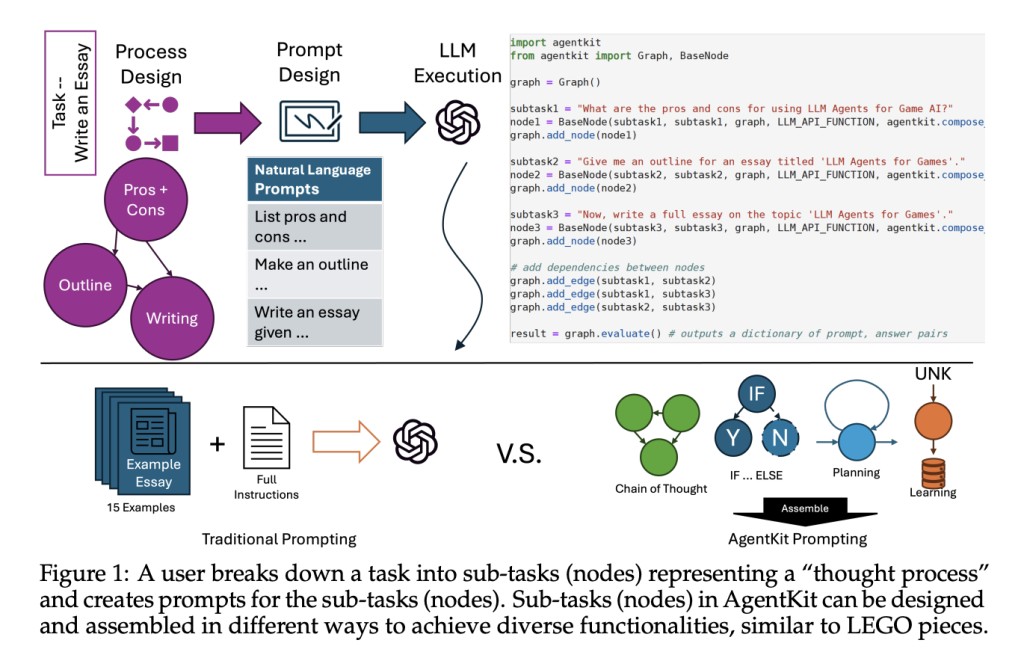Agent-based systems in Artificial Intelligence are ones where AI agents perform tasks autonomously within digital environments. Developing intelligent agents that can understand complex instructions and interact dynamically with their environment poses a significant technological challenge. A prevalent issue in agent design is the reliance on sophisticated programming techniques. Traditionally, agents are constructed using code-intensive methods, necessitating a deep familiarity with specific APIs and often restricting flexibility. Such approaches can stifle innovation and accessibility, limiting the potential applications of AI agents outside specialized domains.
Existing research includes the integration of LLMs like GPT-4 and Chain-of-Thought prompting in agent systems for enhanced planning and interaction. Frameworks like LangChain have refined agent operations, enabling more responsive task management. Innovations by researchers have applied these models to complex scenarios like open-world gaming, using structured prompting to guide agent behavior effectively. These models and frameworks demonstrate a significant shift towards more adaptable and intuitive AI architectures, facilitating dynamic responses and detailed task execution in varying environments.
In a collaborative effort, researchers from Carnegie Mellon University, NVIDIA, Microsoft, and Boston University have introduced AgentKit, a framework enabling users to construct AI agents using natural language instead of code. This method is distinct because it employs a graph-based design where each node represents a sub-task defined by language prompts. This structure allows complex agent behaviors to be pieced together intuitively, enhancing user accessibility and system flexibility.
AgentKit employs a structured methodology, mapping each task to a directed acyclic graph (DAG) node. These nodes, representing individual tasks, are interconnected based on task dependencies, ensuring logical progression and systematic execution. As mentioned, the nodes utilize LLMs, specifically GPT-4, to interpret and generate responses to natural language prompts. The framework dynamically adjusts these nodes during execution, allowing real-time response to environmental changes or task demands. Each node’s output is fed into subsequent nodes, maintaining a continuous and efficient workflow. The methodology is geared towards both flexibility in task management and precision in executing complex sequences of operations.
In testing, AgentKit significantly enhanced task efficiency and adaptability. For instance, the Crafter game simulation improved task completion by 80% compared to existing methods. In the WebShop scenario, AgentKit achieved a 5% higher performance than state-of-the-art models, showcasing its effectiveness in real-time decision-making environments. These results confirm AgentKit’s capability to manage complex tasks through intuitive setups. They illustrate its practical applicability across diverse application domains, achieving robust and measurable improvements in agent-based task execution.
To conclude, AgentKit represents a significant advancement in AI agent development, simplifying the creation of complex agents through natural language prompts instead of traditional coding. By integrating a graph-based design with large language models like GPT-4, AgentKit allows users to dynamically construct and modify AI behaviors. The framework’s successful application in diverse scenarios, such as gaming and e-commerce, demonstrates its effectiveness and versatility. This research highlights the potential for broader adoption of intuitive, accessible AI technologies in various industries.
Check out the Paper and Github. All credit for this research goes to the researchers of this project. Also, don’t forget to follow us on Twitter. Join our Telegram Channel, Discord Channel, and LinkedIn Group.
If you like our work, you will love our newsletter..
Don’t Forget to join our 40k+ ML SubReddit
For Content Partnership, Please Fill Out This Form Here..
The post This AI Paper from CMU Introduces AgentKit: A Machine Learning Framework for Building AI Agents Using Natural Language appeared first on MarkTechPost.
Source: Read MoreÂ

